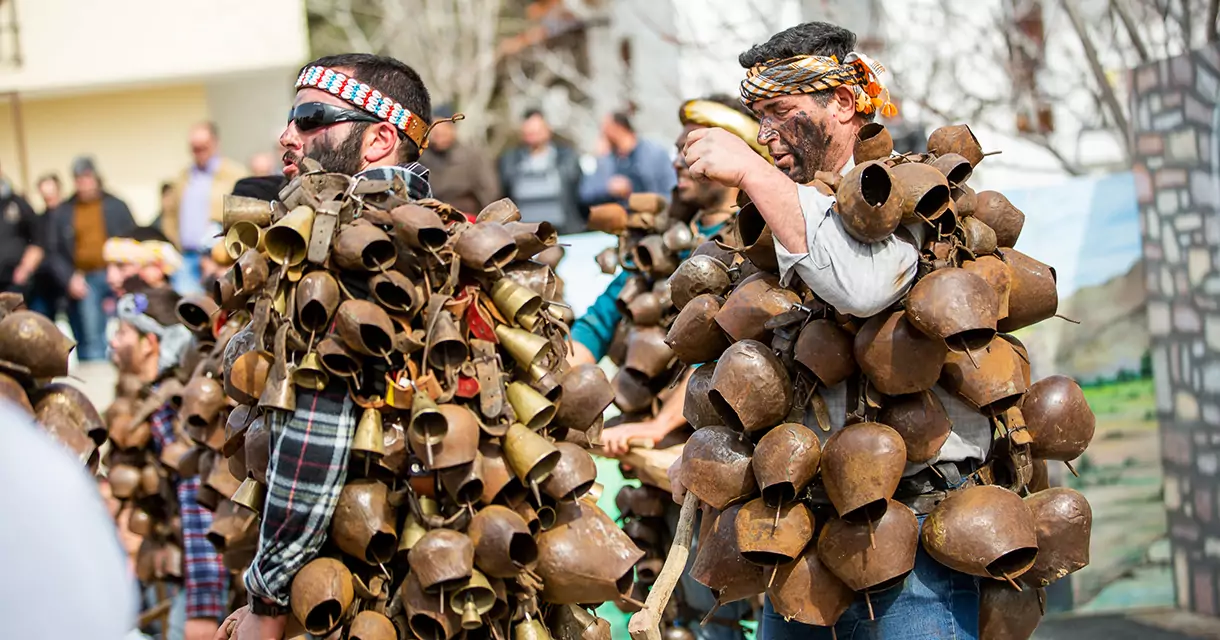Carnival season in Greece -

The Carnival, or Apokries, is one of the most colourful and festive times in Greece. It is a celebration of eating, drinking, and dancing, with street parties, parades and masquerades – All to mark the days before fasting begins. It is also a sign that Winter will soon be over and Spring is on the way.
Apokries means abstention from meat - words apochi and kreas (abstinence and meat), like the latin root of the word carnival.

It traditionally starts ten weeks before Greek Orthodox Easter and peaks on the weekend before “Clean Monday” (Kathara Deftera), the first day of lent.
This duration is divided into three weeks (although in some places celebrations can last for as long as four). The first week opens the carnival and starts with a specific church celebration.
The second week is called Kreatini in which one is allowed to eat meat every day. The Thursday in the Kreatini week is called Tsiknopemptee (Tsikno means the smell of grilled meat and Pempti means Thursday). On this day tavernas are full, as it is customary to take your family out and eat grilled meat. This is also when parties start and the first masquerades for the Greek Carnival make their appearance.
The last week before Lent is called Tyrini, the week of cheese (Tyri being cheese in Greek). This is a week of rich but meatless dishes that culminate typically with a big family meal on the last Sunday before lent begins.
The carnival season also has pagan roots. In ancient Greece the festival in honour of Dionysus was celebrated at this time. Dionysus was the God of wine, agriculture, fertility, dance, and fun. The ancient Greeks held this wine and dance festival to celebrate the return of spring and regeneration. There was a parade with a Dionysos figure, fancy dress, and masks.

The last Sunday of the Greek carnival period is the main day of events where street parties and parades take place everywhere. The most famous carnivals are in Patras, Rethymnon, Galaxidi, Xanti and Kastoria - hosting flour wars, bonfires and vlach weddings to name a few.
BUT a small village in West Lesvos is also famous throughout Greece for its unique carnival celebrations -
In Mesotopos shepherds decorate themselves with bells from their sheep and goats, paint their faces, and wear traditional scarves and hats made out of gourds and rooster and turkey feathers. Held in their hands is the kutskouda, a wooden phallic shaped rod symbolising fertility, which they strike the ground with in order to awaken it.
The procession is led by the Geros (old man) who is dressed all in white. After they pass through the entire village, the celebrations are kicked off with a suggestive traditional dance between two men in costume. The incredible ringing of the bells through the streets is to drive away evil spirits and ensure a good harvest.
The Carnival celebrations in 2024 are from Sunday 25th February to Sunday 17th March - with Clean Monday, a public holiday, falling on 18th March.
We hope you’ll be here to enjoy this fantastic time of year!
Post by Nikki Franks Falloon







Comments